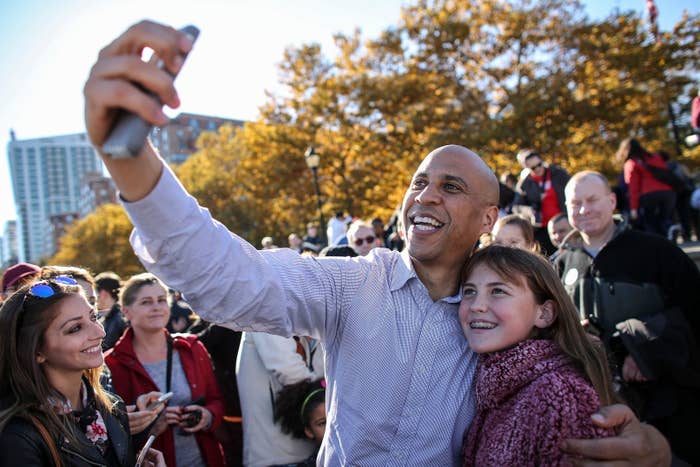
Cory Booker announced his campaign for president on Friday morning with a promise to unite the country behind a mission of “collective action” and “common purpose,” making the New Jersey senator the latest major entry into a Democratic primary that has already drawn a large and diverse field.
The 49-year-old Democrat has been widely expected to run for president since he got to the Senate in 2013. Unapologetically enthusiastic and dramatic, Booker first achieved national attention as Newark's mayor for a series of heroic and constituent service-style feats, neatly catalogued on social media. He's a dynamic speaker, with a tendency to go long, and possessor of an ambitious life story that began in North Jersey suburbia, where his family lived in a predominantly white neighborhood, and took him to Stanford on a football scholarship, to Oxford as a Rhodes scholar, and to Newark’s Central Ward, where an upset victory landed him a seat on the city’s municipal council in 1998.
In a video that accompanied the announcement, Booker outlines what aides have said will be central to his presidential campaign: a message of love, inclusion, and the tradition of “collective action” and “collective will” that’s been at the center of the great civil rights struggles in United States history.
“We are better when we help each other,” he says in the video.
“Together, we will channel our common pain back into our common purpose. Together, America, we will rise,” the senator continues, alluding to one of his favorite poems, “Still I Rise” by Maya Angelou.
The announcement comes on the first day of Black History Month.
Unlike Sen. Elizabeth Warren and several other entries into race, Booker did not launch a so-called “exploratory committee,” a vehicle that would allow him to spend money on a potential campaign without making an official announcement. Booker entered the race on Friday with a full slate of plans for the weekend — including interviews on the nationally syndicated Tom Joyner Morning Show, Univision, and The View — as well as trips planned later this month to Iowa, South Carolina, and New Hampshire.
Booker’s campaign, filed with the Federal Election Committee as “Cory 2020,” will be based in Newark. Addisu Demissie, a longtime Democratic operative and organizer who managed Booker’s first Senate race in 2013 and most recently ran Gov. Gavin Newsom’s successful gubernatorial campaign in California, will serve as campaign manager. Booker also made Jenna Lowenstein, Hillary Clinton’s national digital director in 2016, his deputy campaign manager, signaling a heightened attention to digital strategy.
As a candidate, Booker is likely to occupy an unusual space in the party, balancing lefty views on issues like criminal justice and drug policy with the kind of big-money Wall Street fundraising that has become a target of disdain on the left. He viciously opposed the nomination of former Attorney General Jeff Sessions, but also helped deliver the First Step Act, a modest but very significant bipartisan criminal justice law that seeks to correct tough-on-crime sentencing policies at the federal level. The emphasis on criminal justice — and Booker's self-styled “conspiracy of love” ethos — will be a major part of his pitch to voters.
“I am not going to change or warp myself to try to win any political office. I am who I am,” Booker recently told BuzzFeed News.
Booker, whose home state is comprised heavily of suburbs, is one of three black senators. (Another, California Sen. Kamala Harris, began her presidential campaign last month with a massive rally in Oakland.) Booker perhaps knows better than many candidates the kinds of voters who've become especially important in the Trump administration: older black voters and suburban women. In 2018, he relentlessly campaigned on behalf of Democrats across the country in places both expected (New Jersey, Georgia) and not (North Dakota).
In a competitive primary, though, expect scrutiny of Booker's embrace of charter schools as the mayor of Newark, and his continued high-dollar fundraising as the average voter seems to have turned against it.
Booker aides said that his campaign will be a “movement powered by grassroots donations,” not corporate PACs or lobbyists.
The senator, they added, “opposes” super PACs aiming to support any campaign, including his own. Several major Democratic donors have privately expressed interest in founding a pro-Booker super PAC, or in seeding his campaign with early money and high-dollar fundraising.

